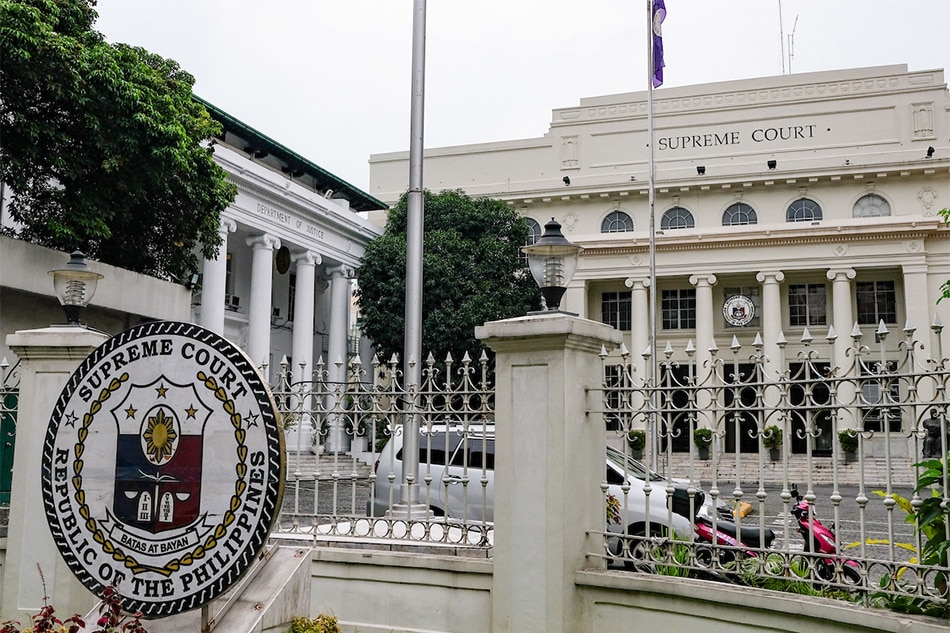SC dismisses Ampatuan contempt petition vs. ABS-CBN | ABS-CBN
ADVERTISEMENT

Welcome, Kapamilya! We use cookies to improve your browsing experience. Continuing to use this site means you agree to our use of cookies. Tell me more!
SC dismisses Ampatuan contempt petition vs. ABS-CBN
SC dismisses Ampatuan contempt petition vs. ABS-CBN
Adrian Ayalin,
ABS-CBN News
Published Jan 06, 2024 01:04 PM PHT
MANILA — The Supreme Court has dismissed the petition for indirect comtempt filed by former Maguindanao Gov. Datu Andal Ampatuan, Jr. against ABS-CBN Corp. and former reporter Jorge Cariño.
MANILA — The Supreme Court has dismissed the petition for indirect comtempt filed by former Maguindanao Gov. Datu Andal Ampatuan, Jr. against ABS-CBN Corp. and former reporter Jorge Cariño.
In a decision dated April 25, 2023, but only recently made public, the Supreme Court en banc granted the petition for review on certiorari of ABS-CBN and also reversed and set aside the decision of the Court of Appeals that affirmed the Regional Trial Court’s refusal to dismiss the indirect contempt petition of Ampatuan.
In a decision dated April 25, 2023, but only recently made public, the Supreme Court en banc granted the petition for review on certiorari of ABS-CBN and also reversed and set aside the decision of the Court of Appeals that affirmed the Regional Trial Court’s refusal to dismiss the indirect contempt petition of Ampatuan.
In 2010, Cariño interviewed Lakmodin Saliao who narrated on TV Patrol that he was present when the Ampatuan family planned the 2009 Maguindanao massacre.
In 2010, Cariño interviewed Lakmodin Saliao who narrated on TV Patrol that he was present when the Ampatuan family planned the 2009 Maguindanao massacre.
The interview prompted Ampatuan’s petition before the RTC to cite Saliao, ABS-CBN and Cariño for indirect contempt claiming that Saliao’s interview was meant to interfere with court proceedings to serve Saliao’s own interest.
The interview prompted Ampatuan’s petition before the RTC to cite Saliao, ABS-CBN and Cariño for indirect contempt claiming that Saliao’s interview was meant to interfere with court proceedings to serve Saliao’s own interest.
ADVERTISEMENT
'USE OF CONTEMPT POWER SHOULD BE JUDICIOUS'
The Supreme Court cautioned in its decision that given the drastic and extraordinary nature of its contempt powers, its exercise must be restrained and judicious.
The Supreme Court cautioned in its decision that given the drastic and extraordinary nature of its contempt powers, its exercise must be restrained and judicious.
“Our power to punish for contempt should never be wielded to stifle comments on public interest,” the Supreme Court said in the decision.
“Our power to punish for contempt should never be wielded to stifle comments on public interest,” the Supreme Court said in the decision.
The Supreme Court said the contempt petition must be dismissed for failing to show the following facts:
The Supreme Court said the contempt petition must be dismissed for failing to show the following facts:
- That public statements were made regarding the merits of the case pending before courts
- The mental element of the speaker showing that the purpose of the speech is to impede the administration of justice
- The clear and present danger of the utterance to the administration of justice
- And the effect of the speech on the court’s independence and public confidence in the judiciary.
- That public statements were made regarding the merits of the case pending before courts
- The mental element of the speaker showing that the purpose of the speech is to impede the administration of justice
- The clear and present danger of the utterance to the administration of justice
- And the effect of the speech on the court’s independence and public confidence in the judiciary.
Amaptuan’s petition failed to state the second and third requirements, according to the Supreme Court.
Amaptuan’s petition failed to state the second and third requirements, according to the Supreme Court.
“Those accused of indirect contempt should not be compelled to proceed to trial when the charges are grossly insufficient,” the court said.
“Those accused of indirect contempt should not be compelled to proceed to trial when the charges are grossly insufficient,” the court said.
ADVERTISEMENT
SC CAUTIONS AGAINST USE OF 'TESTIGO' LABEL
The Supreme Court however added that while ABS-CBN and Cariño were correct that Saliao’s statements were matters of grave public concern, they should not have presented Saliao as a witness on national television.
The Supreme Court however added that while ABS-CBN and Cariño were correct that Saliao’s statements were matters of grave public concern, they should not have presented Saliao as a witness on national television.
“The use of the term ‘testigo’ in Saliao’s presentation to the public removes the distinction between media interviews and witness presentations in open court,” the court said.
“The use of the term ‘testigo’ in Saliao’s presentation to the public removes the distinction between media interviews and witness presentations in open court,” the court said.
The Supreme Court also discussed in the decision how contemptuous speech can now be said online, warning the courts on the importance of social media posts to the court’s administration of justice.
The Supreme Court also discussed in the decision how contemptuous speech can now be said online, warning the courts on the importance of social media posts to the court’s administration of justice.
ADVERTISEMENT
ADVERTISEMENT



